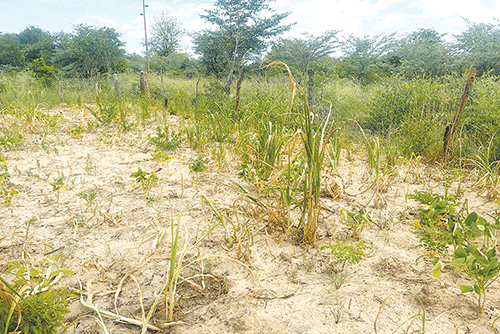KATIMA MULILO – The Angolan police have warned their Namibian counterparts that the poaching of protected wildlife could increase, caused by crop losses in the Zambezi region due to a lack of rainfall for nearly a month.
Southern Africa is currently under El Niño weather patterns, associated with below-average rainfall for most of the region. This is likely to lead to a below-average crop harvest.
El Niño is a climate pattern which describes the unusual warming of surface waters in the eastern Pacific Ocean. In an interview, Zambezi police commander Andreas Shilelo expressed fears that the lack of rainfall experienced in the region will increase poaching incidents, as people seek food by any means possible. He was, however, quick to clarify that although poaching is happening, drought could exacerbate the situation.
“The calamity [drought] is here. The two weeks without rain really had a big impact on the side of the crops in Zambezi. We were informed by our Angolan counterparts that people have resorted to poaching in the national parks. We might have more poaching incidences if it doesn’t rain. We have national parks, so we got that warning from our Angolan counterparts,” said Shilelo.
He confirmed that the Namibian Police is still pursuing four men who were found poaching in the Mudumo National Park on Monday morning.
“As I am speaking now, I have a team which is pursuing a vehicle that was conducting poaching last night in that park. I have a team which is stationed in the park. They heard a gunshot, and swiftly responded. They found a parked vehicle which was used in poaching activities. They chased the vehicle from last night until this morning [Monday] around 09h00,” Shilelo indicated.
The poaching incident occurred around the Singalamwe area on the Namibian/Zambian border.
The police suspect that the poachers were four in a vehicle before fleeing on foot, abandoning their mode of transport near the Namibian border and fleeing into Zambia.
“There are four footprints of people who were in the vehicle. The car had bloodstains in the loading box. While the police were pursuing them, they met two, and they ran away towards Namibia from the border. The police managed to catch one, and he is detained at the Katima Mulilo police station awaiting trial,” the commander continued.
The apprehended suspect is a Zambian national, and was found in possession of a shotgun and eight rounds of ammunition.
“Now, you can see that the warning we got from Angola is true that drought will force people to engage in poaching. The impact will be more in Namibia, as the Zambian side has no national parks. People will be forced to go wherever they can to get food to eat. Drought will force people to go and seek survival in the parks, and Namibia is vulnerable as it has national parks bordering these countries,” Shilelo stated.
Meanwhile, the Climate Prediction Centre’s Africa Hazards Outlook for USAID covering 22 to 28 February states that drought conditions are worsening in many parts of Southern Africa. Due to a delayed start in the rainfall season, followed by insufficient rainfall, abnormal dryness is observed across central and eastern Angola, north-eastern Namibia, western Zambia, northern Botswana, Zimbabwe, central Mozambique and western Madagascar, where rainfall deficits have exceeded 50 mm over the past 30 days.
Just a week ago, communal farmers in Zambezi expressed fear of a severe drought and loss of their crops after the region recorded a deficit in rainfall in the crucial phase of January to date.
Despite good rains received in most parts of Zambezi since December last year, the rainfall patterns dropped in the first week of January, leaving many crops to dry up, while others could not germinate at all. Such an uncertain situation has left many communal farmers worried whether they will get any harvest this year.
In an unrelated incident, the police in the Zambezi region are also pursuing suspects who allegedly broke into a house in Katima Mulilo, and stole a safe with hunting rifles.
“As I am speaking, my team has teamed up with our Zambian police counterparts. We will get some feedback. We confirmed the suspects are in the Mwanawaza location in Zambia, which is not far from the Namibian-Zambian border.
-anakale@nepc.com.na


